Chair's Message Archive - 2024
Anatomic Pathology
Molecular Diagnostics Laboratories
First Genetic Counselor Joined Advanced Molecular Diagnostic Service
We are pleased to announce Meggie Dinh, MS, CGC has joined the Molecular Diagnostics Laboratories for the expansion of the Advanced Molecular Diagnostics Service. Meggie is board certified by the American Board of Genetic Counseling and licensed in California.
She received her MS in Genetic Counseling from the Massachusetts General Hospital Institute of Health Professions and her BS in Biological Sciences from the University of California, Santa Barbara. Prior to her genetic counseling training, Meggie worked at Fulgent Genetics where she gained extensive knowledge and experience in clinical molecular testing. Meggie is the first genetic counselor joining the Molecular Diagnostics Laboratories. We look forward to her contributions to expanding our Advanced Molecular Diagnostics Service in molecular testing of both inherited conditions and cancers (solid tumors and hematologic malignancies).
New IDH1/IDH2 Idylla Test Offers Faster TAT
In September, the Molecular Diagnostic Laboratories launched the new IDH1/IDH2 Idylla test. We are one of the first clinical laboratories to implement the new Idylla testing platform for IDH1 and IDH2. The new test platform features:
- IDH1 and IDH2 hotspot mutation detection in one test
- Faster 2-day turnaround time (TAT)
- Higher sensitivity of 1-5% compared to standard Sanger sequencing test with a sensitivity of 10-15%
Abstract Accepted for the 2024 Annual Meeting of Association for Molecular Pathology (AMP)
An abstract reporting the test validation of this assay has been accepted for poster presentation at the AMP 2024 Annual Meeting and the abstract will be published in the November 2024 issue of The Journal of Molecular Diagnostics:
- Rapid IDH1/IDH2 Mutation Assessment in Acute Myeloid Leukemia (AML) and Glioma
- Authors: Thien A. Huynh, Liying Zhang, Yan Li, Jose Solis, Allison W. Stanley, Hua Jin
Histology & Immunohistochemistry Promotions
Congratulations to our new leaders in the the Histology and ICH labs! We appreciate your hard work and leadership!
- Sandy Htay promoted to Supervisor of Histology – 12/10/23
- Deomarie Sy promoted to Lead Histotechnologist in Histology – 12/10/23
- Nancy Gomez promoted to Lead Histotechnologist in Histology – 4/14/24
- Inna Lozovskaya promoted to Supervisor is Immunohistochemistry – 6/23/24
- Janet Austria promoted to Lead Histotechnologist in Immunohistochemistry – 8/4/24
Laboratory Medicine
Clinical Chemistry
Total Laboratory Automation
- Total Lab Automation (TLA) went live for chemistry at the Ronald Reagan Laboratory on Aug 27, 2024 and the old Modular Pre-Analyticals (MPA) line was removed.
Association for Diagnostics & Laboratory Medicine (ADLM) Annual Meeting – Chicago, IL
- The team presented at the Association for Diagnostics & Laboratory Medicine (ADLM) Annual Meeting from July 28-Aug 1, 2024 in Chicago.
- Poster Presentations
- "Activation" of Macro-AST by Pyridoxal Phosphate Supplementation
- Lu Song, Erica Fermon, Thomas Drake
- Their poster won the third place Best Abstract Award from the Industry Division of ADLM!
- Comparative Analysis of Serology Test Performance: Evaluation of Elecsys Platform for Hepatitis Markers
- Imir Metushi, Susana Kim, Ginny Javier, Diana Ciobanu, Gary Nunez, Richard Jurie, Thomas Drake, Omai Garner
- "Activation" of Macro-AST by Pyridoxal Phosphate Supplementation
- Roundtable Discussion
- From Theory to Reality: A Closer Look at Toxicology Screens for Drugs of Abuse
- MC: Dr. Imir Metushi - the roundtable presentation and discussion format was attended by 19 individuals (10/session max) and occurred over two sessions.
- From Theory to Reality: A Closer Look at Toxicology Screens for Drugs of Abuse
- Breaking Boundaries: Exploring Performance Enhancement and anti-Doping Testing in Sports
- Authors: Imir G. Metushi, Allison Wagner, Brian Ahrens, Magnus Ericsson, Olivier Rabin, Tim Sobolevsky, Travis T Tygart
- Published: 2024; 70(7): 897-904
- A Comparative Analysis of Two Commonly Used FDA-Approved Immunoassays for Fentanyl Detection
- Authors: K H Brian Lam, Marlen Menlyadiev, Vincent Buggs, Suttida Parnprome, Amadeo Pesce, Raymond T Suhandynata, Robert L Fitzgerald, Lu Song, Imir G. Metushi
- Published: . 2024 Sep 3; 9(5):905-912
- "Activation" of Macro-AST by Pyridoxal-5-Phosphate in the Assay to Determine Aspartate Aminotransferase Activities
- Authors: Erica J. Fermon, Marlon Sy, Thomas A. Drake, and Lu Song
- Published: . 2024 Oct 16
Other Updates
- Lu Song was invited to present on “Interference of Monoclonal Proteins with Spectrophotometric Methods” at the 10th annual Conference of AnalytiX in Nagoya Japan on April 22, 2024.
- Continued efforts spent in updating chemistry assays with improved sensitivity, specificity, and linearity, or results reporting.
Microbiology
2024 is the Year of Lab Efficiency in Micro division, aiming for enhancing labor efficiency, reducing workflow complexity, and improving throughput and speed.
Lab Efficiency in Virology Section: Converting manual multi-step low-throughput Polymerase chain reaction (PCR) assays to fully automated high-throughput platform (Roche Cobas 6800/8800 for Epstein-Barr virus (EBV) and BK polyomavirus (BKV) viral load tests and FluA/B & Respiratory syncytial virus (RSV) PCR tests).
Lab Efficiency in Bacti Section: Converting culture-based labor-intensive and time-consuming tests to high-throughput rapid molecular tests (Laboratory developed tests for Legionella PCR and Nocardia PCR).
Lab Efficiency in NGS Section: converting manual multi-step NGS library prep to fully automated system (Tecan MagicPrep); save one day of labor per run and allow workflow flexibility.
Transfusion Medicine
Blood Bank
- Implemented new/revised MTP protocols, including a new blood product, Intercept Fibrinogen Concentrate (IFC), which is maintained thawed in each blood bank for immediate release for obstetric patients requiring massive transfusion.
- Implemented the new Blood Transfusion Report that allow physicians, nurses, and clinical staff to easily and efficiently see a consolidated view of a patient's Type and Screen/Check Type status, Last Type and Screen Result, Blood Bank Test results, relevant Lab Results, links to Transfusion Policy and Consent Policy documents and Blood Consent/Refusal documents from the Chart, transfusion and transfusion reaction history. Example below (click to enlarge).
- Published the 2024-2026 edition of the “Transfusion Medicine Pocket Reference” with the addition of our first Clinical Laboratory Pocket Reference. These pocket references contain important information on blood bank tests, transfusion products, transfusion reactions and blood bank protocols, as well as specimen collection information. They are distributed to nursing and housestaff. Hard copies are available from the RR Blood Bank. Examples below (click to enlarge).
Blood & Platelet Center
- UCLA Blood & Platelet Center implemented an initiative to perform full RBC phenotype on donors who self-identify as African American to support RBC phenotype-matching needs for patients with sickle cell disease.
Advancing Quality and Stewardship Across Pathology and Laboratory Medicine
As we look back on Fiscal Year 2024, it’s exciting to reflect on the synergy between our Quality Improvement and Laboratory Stewardship programs. Both initiatives have been instrumental in driving enhancements in patient care, operational efficiency, and embedding a culture of continuous improvement across the department.
We are pleased to announce that Maria Estrada, MHA, PMP, has joined our team as the new Program manager for Equity, Diversity, and Inclusion, Laboratory Stewardship, and Quality Improvement programs. Maria will be working alongside Monique Trinh and the program leads to lead these efforts and further expand our impact across the department. Her expertise in project management and dedication to quality improvement will be instrumental as we continue to drive forward key initiatives and streamline processes to enhance laboratory efficiency and patient care outcomes.
Laboratory Stewardship Updates
The Laboratory Stewardship Task Force (LSTF), led by Co-Chairs Dr. Allison Chambliss, Dr. Josh Deignan, and Alexander Martin, PA (ASCP), MHA, and Dr. Omai Garner, Vice Chair of Clinical Laboratory Affairs, continues its mission to improve the appropriateness, value, and efficiency of lab testing throughout the health system. From policy revisions that streamline workflows to new clinical decision support tools that reduce unnecessary testing, we are setting the standard for excellence and stewardship.
We are excited to launch our new , which provides an overview of the program and its structure, recent accomplishments, and resources for clinicians. Please visit the webpage for the latest updates and information on how you can get involved.
Key Lab Stewardship Ongoing Projects and Accomplishments

THANK YOU to the members of LSTF and other collaborators both within and outside of the Department of Pathology & Laboratory Medicine for their time and efforts that have contributed to the success of these initiatives!
Highlights
Two abstracts presented at the PLUGS Summit held in Seattle, WA in June 2024:
- Chambliss A, Deignan J, Isip C, Martin A, Trinh M, Visico M, Were W, Ziman. Reducing “Miscellaneous” Referral Test Orders at an Academic Medical Center. (Best Abstract Award)
- Deignan J, Chambliss A, Rapoport S, Cheng E. An Automated EMR Workflow to Facilitate Genetic Consultation and Review of Inpatient Genetic Test Requests at UCLA.
Two articles published in ADLM’s Clinical Laboratory News:
- (Monique Trinh and Dr. Allison Chambliss)
- (Dr. Josh Deignan)
Quality Improvement Updates
As we continue to build a culture of quality within the Department of Pathology and Laboratory Medicine, our Quality Improvement (QI) Program stands at the forefront of driving impactful, sustainable changes. This past year, we have not only expanded our QI efforts but also fostered critical interdisciplinary collaborations that transcend departmental silos, enhancing our ability to deliver superior patient care and operational excellence.
The QI Co-Chairs and program managers are leading the charge in building a robust QI infrastructure and ensuring that projects are aligned with both our strategic objectives and the department’s long-term vision. We are excited to welcome the Point of Care Testing Optimization project to the roster of QLC projects:

Key QI Program Accomplishments:
- Project Portfolio Growth: We now manage multiple projects across various stages, with 8 QLC projects, 8+ Q-CEP projects, and 5 QUIC projects in active development. This expansion showcases the department’s commitment to innovation and continuous improvement.
- Collaborative Successes: Our QI program has fostered 8 active partnerships with external stakeholders in the UCLA Health organization, allowing us to tackle complex, cross-departmental challenges through a unified approach.
- Pathology & Laboratory Medicine Quality Improvement Toolkit: We are developing a comprehensive toolkit to provide clinicians and staff with resources to apply QI science methods effectively, supporting the testing of interventions and enhancing data analysis capabilities.
On October 2, 2024, the Equity, Diversity, and Inclusion, Informatics, Laboratory Stewardship, Quality Improvement, and Wellness leaders met for their inaugural Strategic Alignment Meeting. Together, they identified mutual challenges and cocreated solutions by identifying cross-program collaboration opportunities to . They look forward to cultivating a cohesive, collaborative, and functional environment where all the programs work synergistically to improve patient care, advance health equity, and enhance the quality of outcomes across UCLA and beyond.
Looking ahead, we aim to expand our reach even further. In FY25, our focus will be on refining processes, scaling successful projects, and integrating new initiatives to ensure sustained progress. The foundation we’ve built positions us to continue leading in laboratory stewardship and quality improvement across UCLA Health.
Veterans Day
In honor of Veterans Day, we would like to thank our Department veterans and active duty military/reserve members! We appreciate your service to our country and to our patients by providing leading-edge patient care, research, and education. It is an honor to feature our department veterans.



Be Part of the Change: Join Us in Advancing Equity, Diversity, and Inclusion (EDI)
The Department of Pathology and Laboratory Medicine (PLM) is deeply committed to advancing Justice, Equity, Diversity, and Inclusion (JEDI) across all facets of our work. Grounded in our Cultural North Star values of doing what’s right, making things better, and being kind, our JEDI Plan outlines a comprehensive approach to building an inclusive environment. We invite you to explore how you can get involved and make a meaningful impact!
Explore Our EDI Initiatives: We are excited to announce the launch of our new ! Here everyone (faculty, staff, trainees, students) can dive into our existing initiatives/programs and learn about our upcoming projects (see also JEDI Plan in Action below).
Join us!: Here are some of the ways you can help our EDI efforts (information in the parentheses indicates which section of our JEDI report provides additional information)
- Contribute to expanding the recruitment pathways into Pathology with our community partners (“Community Engagement”)
- Assist in refining our recruitment, onboarding, and retention processes for staff and trainees to ensure we attract and retain diverse talent (“Structural Elements”)
- Help ensure our department has a welcoming, inclusive and supportive environment by offering your input and working on needed changes (“Climate”)
- Create EDI-focused educational opportunities and help improve our understanding of what EDI education our employees would like (“Professional Development/Education”)
- Collaborate to address disparities in patient care and work towards equitable healthcare for all (“Patient Care”)
- Help us understand how our workforce does or doesn’t reflect the demographics of our communities, and create strategies to improve diversity as needed (“People”)
Sign Up to be a part of our EDI journey! (Link is external) (Link opens in new window)
Featured Initiatives: JEDI Plan in Action
We are thrilled to highlight two of our recent initiatives.
Partnership with Turner-UCLA Allied Healthcare Internship Program
This summer, PLM's EDI Committee proudly continued its partnership with the offering a transformative experience for 65 students from under-resourced communities throughout Los Angeles. Over the past seven years, this collaboration has hosted 21 cohorts, reached 321 students and introduced them to potential allied healthcare careers in Pathology and Laboratory Medicine, including careers in healthcare administration.
Over the course of a week, the students had the unique opportunity to immerse themselves in various areas throughout the UCLA Health system. Our department was honored to host “Lab Day,” where we welcomed the students for five sessions, showcasing key areas of our work. Students participated in rotations and tours across several of our laboratories, including the Blood and Platelet Center, Clinical Laboratory, Cytology, Surgical Pathology, and Molecular Genetics. These experiences provided them with a comprehensive view of the critical roles our department plays in patient care and diagnostics, offering firsthand insights into careers they may not have otherwise considered. Additionally, we hosted a healthcare administration panel, where students engaged with professionals who shared their journeys and offered guidance on how to grow as an allied health professional while navigating the complexities of the healthcare field.
The impact of this partnership is best captured through the voices of volunteers themselves:


“Sharing my blood bank experience and knowledge to future health care professionals was rewarding, as it allowed me to inspire the next generation, while highlighting the critical role of transfusion medicine in patient care.” – Janet Baez, Senior CLS Specialist

"Cytology is the study of cells and has always been an extension of Pathology. However, it is a career little known to the general public.
This has been a great opportunity to introduce Cytology to the bright, young interns of the Turner-UCLA Allied Health Internship Program. Our staff presented an introduction lecture and hosted a multiheaded microscope session to show various kinds of cells and disease processes. The interns were highly enthusiastic and excited to learn about Cytology."
– Po Chu Fung, Senior Cytotechnologist and Education Coordinator


"Being able to volunteer to support the Turner-UCLA Allied Health Internship allowed me the opportunity to give back and connect with the community and demonstrate the possibilities of working in healthcare from a different perspective.
The most valuable aspect for me was getting to introduce the field of pathology! We are a bit of a small bubble of medicine, but important nonetheless so being able to show the students a different side of medicine that they may be interested in was very rewarding.
I think seeing some of the students faces when I showed them the variety of specimens! It ranged from awe to maybe a little grossed out.
It definitely impacted me personally considering I wish I was able to take part in an internship like this. Showing prospective students other fields of medicine allows them find areas that interest them and not just traditional routes that they may be familiar with.
It was a wonderful experience and I'm glad to have been a part of it, there is nothing I would change from my end." – Alexander Novak, Pathologists' Assistant (PA), Surgical Pathology.

Empowering Harmonious Futures with Dr. Melanie Ho and the Department of Pediatrics

As the inaugural recipients of the Cultural North Star in Action Grants, we had the privilege of hosting Dr. Melanie Ho, author of Beyond Leaning In, for a transformative three-part workshop series titled "Empowering Harmonious Futures: Navigating EDI in Leadership." This series brought together over 200 participants, who came together to grow, enhance their leadership skills, and advocate for EDI through three specially curated workshops.
To make this event possible, we collaborated with the Department of Pediatrics EDI Committee and Pediatric Women in Science and Doctors of Medicine (WiSDoM). The resources and support from these partnerships were instrumental in providing participants with valuable tools to engage in challenging EDI conversations, examine organizational culture, and navigate complex change.
For those who were unable to attend the workshops, recordings of the workshops are available on our .
For the next phase of our “Empowering Harmonious Futures” journey, we are excited to announce our upcoming book club, where we’ll dive deeper into Dr. Ho’s book, exploring actionable steps to navigate workplace challenges and redefine leadership through collaboration, allyship, and innovation.
Sign Up to be a part of the enriching discussion!(Link is external) (Link opens in new window)
Meet Our EDI Leaders
I am so grateful to our dedicated team of EDI Co-Chairs and Program Managers. They contribute diverse perspectives and expertise from across the department and they are passionate advocates for EDI efforts! Learn more about our EDI leaders and their contributions by visiting the .
We would like to extend our gratitude to Dr. David Lu, who, as an inaugural Faculty Co-Chair, spearheaded key initiatives and established a strong foundation that we will continue to build upon. Following a comprehensive search, we are pleased to announce Dr. Rebecca Sosa as the new Faculty Co-Chair, succeeding Dr. Lu.
Feature: Pathways to Careers in Pathology
- Medical School
- Post-Sophomore/Junior Pathology Fellowship
- Pathology Residency
- Dermatopathology Fellowship
- Faculty Member, UCLA
- Assistant Dean of Student Affairs, DGSOM
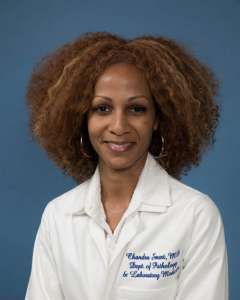
I came to UCLA in the fall of 1993, excited to embark on what I thought was the beginning of the journey to reach my career goal of becoming an engineer. However, after taking a few prerequisite courses, I quickly realized that I needed to do a bit of soul searching as I did not enjoy the curriculum one bit. At that point, I was left wondering about what I was going to do with my life. Since I always liked biology in high school, I decided to change my major to general biology with the intention of using the remainder of my time in undergrad to figure out exactly what I would ultimately do with that major.
Throughout the remainder of my college career, while fulfilling the requirements for my newly selected major, I took a variety courses including plant physiology, the biology of evolution, and histology, just to name a few. As one might imagine, histology was one of my favorite courses, almost ranking up there with Ellingtonia.
Toward the end of my third year in undergrad, I started volunteering at the Los Angeles Free Clinic, an experience that completely changed my career trajectory as I was able to see the tremendous impact the wonderful primary care physicians had on their patients. At that point, it became clear, I wanted to follow in their footsteps. Consequently, I decided to apply to medical school to pursue a career as a physician. However, as my decision to do so did not occur until my final year in college, I took the following year off to complete the application process.
At that point, I also had to figure out what else I was going to do for that year. As I had always enjoyed tutoring both junior high and high school students while volunteering during undergrad, I decided to take the credentialing exam for teachers. After obtaining my teaching credentials, I accepted a position teaching 7th and 8th grade science at Audubon Middle School. Having also applied to medical school during this year, I eventually received the terrific news that I had been accepted into the UCLA/Drew Medical Education Program for the following year.
During my pre-clerkship years, I was exposed to a variety of interesting subjects which included histology, pathology, physiology, pharmacology, and biochemistry, among others. However, the histology and pathology lectures/lab sessions were the ones I always looked forward to the most. These sessions were taught by pathologists who would run their sessions and then disappear. I knew they were MDs, but I was always left wondering: What do pathologists do besides teach? (I will come back to this later in the story).
Once I began my clerkships, I quickly realized that pursuing a career in primary care was not for me. Luckily, I remembered Dr. Scott Nelson coming into one of our lectures during the previous year to talk about the post-sophomore/junior pathology fellowship at UCLA. Since I was once again at a crossroads, unsure of what path I was going to take moving forward, I decided to apply for the pathology fellowship, which I began after completing my clerkships. During my fellowship year, in addition to having the opportunity to learn about every facet of pathology (answering my previous question above, “what do pathologists do besides teach?”), I realized that pathology was the specialty I wanted to pursue.
After subsequently completing both my AP/CP residency and dermatopathology fellowship at UCLA, I decided to remain in academics and stay on as a faculty member. In doing so, I was able to continue pursuing my professional career goals while also fulfilling my desire to both teach and work with medical students. Consequently, I became involved in medical education during my first year, volunteering in the histopathology labs with Dr. Tom Drake, working as a problem-based learning tutor, and eventually becoming a Co-Chair of the Human Biology and Disease Course in the Legacy Curriculum. As my career evolved, I decided that I wanted to have a longitudinal presence in the academic careers of medical students, which ultimately led me to pursue an opportunity to become an Assistant Dean of Student Affairs, a position I currently occupy. In this role, it has been extremely rewarding to serve as a mentor and advisor to a diverse group of students during all four years of their medical school education. Although my journey to get where I am today has been a bit circuitous, I am happy those twists and turns led me to a place where I am truly satisfied with my career and delighted that it all happened at UCLA.
Department Summer Picnic
Thank you to all those who attended the 2024 Department Summer Picnic! We are thrilled to have received great feedback on the selection of food trucks, the photo/video booths, lawn games, and the silent disco!
Our Summer Picnic Committee (Anastasia Gustafson, Heidi Martinez, Elijah Williams, Kelli Scott, Mary Alice Mita) spent many hours planning and coordinating this event. If you see them, please thank them for all their hard work and the wonderful event!
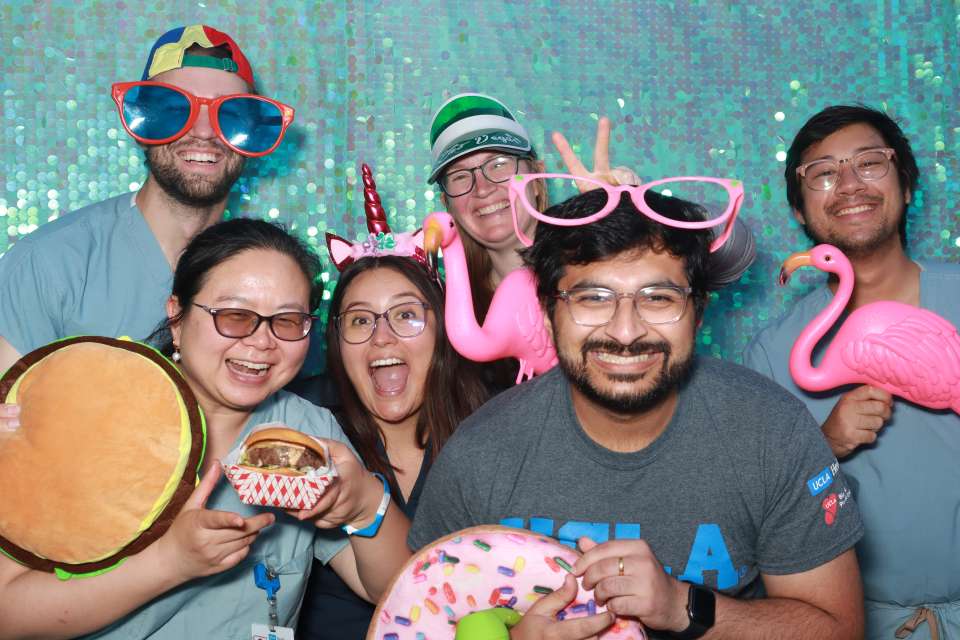
The journey to Pathology can take many different paths. Pathology Pathways programs provide opportunities for individuals to be immersed in a variety of Pathology-focused environments.
Pathology Pathways offered at UCLA include: Post-Sophomore or Post-Junior Fellowship during medical school, completing an accredited Allied Health Training Program, clinical rotations for Clinical Laboratory Scientist/Pathologists' Assistants/Microtechs programs, or other educational opportunities.
This month, I highlight stories of individuals who followed a Pathology Pathway that led them to their current position in department and what inspired them on their journey.
Precious Fortes, MD, MHS

- Medical School
- Post-Sophomore Fellowship
- Pathology Residency
- Cytopathology Fellowship
My journey to the field of Pathology was tremendously influenced by the post-sophomore fellowship (PSF) program at UCLA. I initially pursued a career in medicine with the desire to become an OBGYN or family medicine physician, but my trajectory changed through the yearlong PSF. There, I gained invaluable experience in various pathology subspecialties, including transfusion medicine, surgical pathology (including GYN pathology), and cytopathology. I also learned about the incredible opportunities in pathology to engage in meaningful research and community outreach events.
Choosing UCLA for my residency was a natural choice due to its comprehensive training program, as well as outstanding faculty. As a resident, I discovered my passion for cytopathology, which allows pathologists to work with diverse cytologic specimens and make rapid, detailed diagnoses from fine needle aspirations. The mentorship and collaborative environment at UCLA have been instrumental in my growth, especially during the challenges of a global pandemic and raising three small children. To those considering pathology, I encourage you to approach the journey with an open mind and a passion for learning. For those not yet considering pathology, I highly recommend pursuing a PSF program to explore a field that offers a unique blend of clinical and laboratory work that is both intellectually stimulating and impactful on patient care.
Learn More About our PSF/PSJ Fellowships(Link opens in new window)
Jowin P. Rioveros, BB (ASCP)CM

- Clinical Immunohematology (Blood Banking) Scientist Program
- Transfusion Medicine Compliance Officer
- Senior Clinical Laboratory Scientist Supervisor
- Director, Blood & Platelet Center
- Manager, Regulatory Affairs
I began my career journey at UCLA in 2010 as the inaugural Transfusion Medicine (TM) Clinical Immunohematologist Scientist apprentice, one of the allied health educational programs offered by the Department of Pathology & Laboratory Medicine. During my apprenticeship, I gained comprehensive experience across all facets of TM, including rotations through the Blood & Platelet Center (BPC), Component Processing Laboratory (CPL), Hemapheresis unit, and Transfusion Services (TS). The rotation also included collaborating closely with Quality Assurance and Medical teams which further enriched my understanding and later paved way to a successful career track within UCLA.
Following completion of the program, I successfully passed the examination administered by the American Society for Clinical Pathology (ASCP) and deemed eligible for limited licensure as a Clinical Immunohematologist Scientist by the State of California. I then transitioned to performing patient testing within TS/Blood Bank. Drawing on my prior experience in quality and manufacturing, I was appointed TM Compliance Officer in 2013 and subsequently advanced to Senior CLS Supervisor in CPL by 2015. In 2020, I assumed the role of Director of the BPC, and in 2022, I transitioned to Manager of Regulatory Affairs within the Department of Pathology & Laboratory Medicine.
My journey into blood banking was propelled by my extensive background in ensuring standards and precision in processes. This foundation is particularly suited to the meticulous nature of blood banking, where accuracy and adherence to protocols are paramount. My previous work experience provides a robust framework to contribute effectively to this essential field, leveraging my skills in quality control and manufacturing processes to uphold the delivery of high-quality blood products to patients in need.
Pursuing a career in Pathology and Laboratory Medicine is highly commendable. In this profession, your role is essential in diagnosing and treating patients, directly influencing healthcare outcomes. The field continually evolves with new technologies and discoveries, guaranteeing ongoing challenges and opportunities for learning. With increasing demand for skilled professionals, there is stability and abundant career opportunities. Working closely with clinicians, researchers, and healthcare providers fosters a strong sense of teamwork and shared purpose. Above all, the personal fulfillment and satisfaction of knowing that your work directly improves the lives of others is unmatched.
Shaun Yang, PhD, D(ABMM), MLS(ASCP)

- PhD
- Quality Improvement Project Lead
- Clinical Laboratory Scientist, UCLA
- Internship, Microbiology, UCLA
- Senior Specialist and Supervisor of the Molecular Microbiology Laboratory, CHLA
- Clinical Microbiology Postdoctoral Fellow, UCLA
- Assistant Professor of Pathology, University of New Mexico + Director of Molecular Microbiology Laboratory
- Associate Professor, Pathology & Laboratory Medicine, UCLA + Director, Molecular Microbiology and Pathogen Genomics (MMPG) Laboratory + Associate Medical Director, Clinical Microbiology Laboratory
After 7 years of PhD and postdoctoral training in molecular biology and prostate cancer research, I thought I would retire from a career finding cures for cancer. Yet deep inside me, a voice urged me to find a job that can directly help patients. At the age of 28, I gave the future a second thought. I had to choose between being an illustrious cancer research scientist for Novartis in Boston or a modest clinical laboratory technologist (CLT) and quality improvement project lead for Genzyme Genetics (later acquired by Labcorp) in Los Angeles. I chose the latter. My first humble position turned out to be a perfect opportunity to utilize my problem-solving skills and creativity. With lots of passion and energy, I implemented changes and spruced up quality and efficiency. Directly seeing the positive impact of my work and innovation became my ultimate source of motivation. Getting into the business of clinical laboratories reset my starting point, prompting me to go back to school to enroll into a clinical laboratory scientist training program, which took 2 arduous years. Still a full-time worker, I changed to night shift so I could take classes at Cal State Dominguez Hills during the day and completed a one-year internship at the UCLA Ronald Reagan Medical Center. A 4-month rotation at the clinical microbiology laboratory in Brentwood changed my destiny. All the people there moved mountains trying to teach me everything they knew. “Clinical microbiologists are so cool!” I thought to myself 15 years ago. I enjoyed learning microbiology so much I felt like I unearthed my second life. Never in my wildest dreams could I imagine becoming the associate director of this very lab that warmly welcomed me as a humble CLS trainee a decade earlier.
After I obtained my CLS license, I was already 31. Opportunities overwhelmed me, but I wanted to go back to molecular diagnostics as I had more than a decade of education and training in molecular biology on my hands! Again, destiny chose me: I was hired as a senior specialist and supervisor of the molecular microbiology laboratory at the Children’s Hospital Los Angeles (CHLA). 14 years ago, molecular testing began replacing culture and antigen-based tests, and I caught this historic wave. I developed, validated, and implemented more than 20 tests in just two years. I transformed the landscape of clinical microbiology testing at CHLA and drastically improved testing capacity, turn-around-time, and cost effectiveness. I also set up a next-generation sequencing (NGS) core lab dedicated to researching the human microbiome. These accomplishments prompted me to seek further training in clinical microbiology at the post-doctoral level. Five years after my CLS internship at UCLA, I was fortunate to come back to UCLA as a clinical microbiology postdoctoral fellow for another two years of training in this prestigious program. Everyone in Brentwood cheered when I returned, as if I was one of their family. I was fortunate to receive the state-of-the-art training from some of the best clinical microbiologists in the world. I then went to the University of New Mexico as an assistant professor of pathology and the director of molecular microbiology laboratory at the TriCore Reference Laboratory for 2 years before being hired back by UCLA as a faculty member in the Department of Pathology and Laboratory Medicine.
My career path is an adventure driven by my desire to help patients, and my motivation to convert my skills, knowledge and creativity into positive impact. Pathology is the perfect profession to combine my strong scientific training with such desire to help people directly. It wasn’t an easy journey, and I was fortunate to have the full support from my family (my wife had to endure me changing jobs and relocating every few years and without seeing me most of the time during my training). Along the way, UCLA and the Department of Pathology and Laboratory Medicine provided me with life-changing education opportunities and world-class training, for which I am forever grateful.
As we begin the new academic year, I would like to provide a warm welcome to our new Residents, Fellows, and Faculty. Additionally, I would like to highlight the Farewell Ceremony awards and recipients.
New Trainees
Please join me in welcoming our new PGY1 Residents and new Post Junior Fellows, ACGME Fellows, Non-ACGME Fellows, and Clinical Post Docs!
New Faculty

Dr. Liang Ding will be joining the division of Anatomic Pathology as an Assistant Professor, starting July 1, 2024.
Dr. Ding obtained his medical training from Nanjing University School of Medicine in Jiangsu province, China. He obtained his PhD in molecular medicine from Nanjing University and King's College London, UK. He completed his AP/CP Pathology Residency training at the State University of New York.
Additionally, he completed a Surgical Pathology Fellowship at UCLA as well as a Cytopathology Fellowship at the Mayo Clinic, Rochester, Minnesota. We are delighted to welcome Dr. Ding in his new role as AP Quality Faculty Lead. He will also be providing clinical service coverage in the sections of Breast, GYN Pathology, and Cytopathology.

Dr. Teresa Kim will be joining the division of Anatomic Pathology as an Assistant Professor, starting July 11, 2024.
Dr. Kim obtained her medical training from Albert Einstein College of Medicine in Bronx, New York. She completed her AP/CP Pathology Residency training at UCLA, where she also became a Chief Resident.
Additionally, she completed a Cytopathology as well as a Surgical Pathology/GYN Pathology Fellowship at UCLA. We are delighted to welcome Dr. Kim in her new role in the sections of Breast, GYN Pathology, and Cytopathology.

Dr. Kenechukwu Ojukwu will be joining the division of Anatomic Pathology as an Assistant Professor, starting July 1, 2024.
Dr. Ojukwu obtained her medical training from Charles Drew University of Medicine and Science and through the UCLA Medical Education Program. She completed her AP/CP Pathology Residency at Harbor-UCLA Medical Center.
Additionally, she completed a Surgical Pathology Fellowship at Cedars-Sinai Medical Center. She also completed a fellowship at UCLA in the National Clinical Scholars Program with an emphasis in academic and community medical education. We are delighted to welcome Dr. Ojukwu in her new role as a Bruin Scholar in patient-centered health education research, focusing on interventions that engage populations affected by health inequities. She will also be providing clinical service coverage as a General Pathologist at Northridge Hospital.
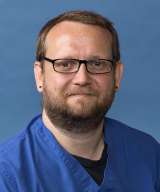
Dr. Daniel Stefanko will be joining the division of Anatomic Pathology as a Clinical Instructor, starting July 1, 2024.
Dr. Stefanko obtained his medical training from the University of Southern California. He completed his AP/CP Pathology Residency training at the University of California San Diego (UCSD).
Additionally, he completed a Cardiovascular/Pulmonary Pathology as well as a Gastrointestinal (GI) and Liver Pathology Fellowship at UCLA. We are delighted to welcome Dr. Stefanko in his new role in the sections of Cardiovascular/Pulmonary Pathology, Autopsy, and Gastrointestinal (GI) Pathology.
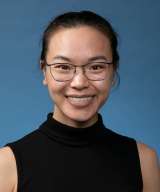
Dr. Sarah Zhang will be joining the division of Anatomic Pathology as an Assistant Professor, starting July 1, 2024.
Dr. Zhang obtained her medical training from New York University School of Medicine. She completed her AP/CP Pathology Residency training at UCLA where she also became a Chief Resident.
Additionally, she completed a Gastrointestinal (GI) and Liver Pathology Fellowship at UCLA. We are delighted to welcome Dr. Zhang in her new role in the sections of Gastrointestinal (GI) and Liver Pathology.
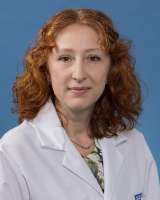
Dr. Anamaria Munteanu will be joining the division of Anatomic Pathology as a Clinical Instructor, starting August 1, 2024.
Dr. Munteanu obtained her medical training from Carol Davila University of Medicine and Pharmacy in Bucharest, Romania. She completed her AP/CP Pathology Residency training at the Harbor-UCLA Medical Center.
Additionally, she completed a Hematopathology Fellowship at the City of Hope Medical Center as well as a Molecular Genetic Pathology Fellowship at UCLA. We are delighted to welcome Dr. Munteanu in her new role in the sections of Hematopathology and Molecular Pathology.
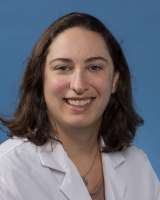
Dr. Chana Sachs will be joining the division of Anatomic Pathology as an Assistant Professor, starting August 1, 2024.
Dr. Sachs obtained her medical training from Carver College of Medicine, University of Iowa. She completed her AP/CP Pathology Residency training at UCLA, where she also became a Chief Resident.
Additionally, she completed a Surgical Pathology Fellowship at UCLA. We are delighted to welcome Dr. Sachs in her new role in the sections of General Pathology and Head & Neck Pathology.
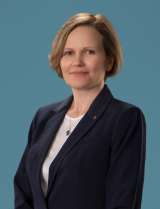
Dr. Olga Timofeeva will be joining the Department of Pathology and Laboratory Medicine as a Health Sciences Clinical Professor, starting August 4, 2024.
Dr. Timofeeva earned her M.S. in Molecular Biology at the Novosibirsk State University in 1995 and Ph.D. in Biochemistry at the Institute of Chemical Biology and Fundamental Medicine, Novosibirsk, Russia in 2000. She was a postdoctoral researcher at the Department of Pathology, Oslo University Hospital - Rikshospitalet, Norway in 2001, National Institute of Cancer, National Institute of Health between 2001-2006 and Georgetown University between 2006-2008.
Dr. Timofeeva was appointed as an Assistant Professor at the Lombardi Comprehensive Cancer Center, Georgetown University in 2009. She was trained in the field of Immunogenetics and Histocompatibility Testing between 2012-2016 and became a board-certified Laboratory Director in Immunogenetics by the American Board of Histocompatibility and Immunogenetics in 2014. Between 2016-2019, Dr. Timofeeva served as the Associate Professor at the Lewis Katz School of Medicine at Temple University. She also directed the Molecular Pathology Laboratory and the Immunogenetics Laboratory at the Temple University Hospital. In 2019, Dr. Timofeeva joined MedStar Georgetown University Hospital as a Director of Histocompatibility Laboratory and a Professor at the Georgetown University School of Medicine.
She is passionate about clinical diagnostics in solid organ and hematopoietic cell transplantation, teaching immunology and histocompatibility for healthcare professionals, participating in the transplant multidisciplinary research and serving on ASHI committees. Currently, Dr. Timofeeva serves as a Program Director for the ASHI Proficiency Testing Committee, a Middle Co-Chair of the Quality Assurance and Standards Committee, a member of the ACHI Portfolio Committee, and an active ASHI and CAP inspector. Her current research is focused on the understanding of HLA immunogenicity in transplantation and the use of HLA antibody test results as predictive biomarkers for pre-transplant desensitization and treatment of antibody-mediated rejection to improve long-term transplant outcomes.
Please join us in welcoming Dr. Timofeeva to the UCLA Immunogenetics Center and Department of Pathology and Laboratory Medicine.
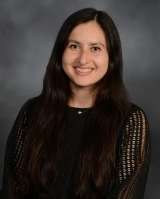
Dr. Diana Vulcain will be joining the division of Anatomic Pathology as an Assistant Professor, starting August 1, 2024.
Dr. Vulcain obtained her medical training from Howard University College of Medicine. She completed her AP/CP Pathology Residency training at the New York-Presbyterian Hospital/Weill Cornell Medical Center.
Additionally, she completed a Breast Pathology Fellowship at Weill Cornell Medical Center. We are delighted to welcome Dr. Vulcain in her new role in the sections of Breast Pathology and Autopsy.

Dr. Harry Pickering will be joining the Division of Immunogenetics as an Assistant Professor, starting September 2, 2024. Dr. Pickering obtained his BSc in Biological Sciences and Immunology at the University of Edinburgh and MSc in Molecular Biology of Parasites and Disease Vectors at the Liverpool School of Tropical Medicine, both in the UK. He completed his PhD in Infectious & Tropical Diseases at the London School of Hygiene & Tropical Medicine.
Dr. Pickering was a post-doctoral research scholar in the Department of Pathology & Laboratory Medicine at UCLA from 2020, initially as a Postdoctoral Researcher before progressing to Project Scientist in 2023. Dr. Pickering’s current research focuses on understanding the interaction between the innate and adaptive immune responses in viral infection in immunosuppressed transplant recipients. His research utilizes modern systems immunology approaches including multiparameter immunophenotyping, transcriptomics, proteomics and epigenetics coupled with bioinformatics and computational modeling to understand disease mechanisms and for predicting clinical outcomes.
Please join us in welcoming Dr. Pickering to the UCLA Immunogenetics Center and Department of Pathology and Laboratory Medicine.
Major Academic Actions
Farewell Ceremony
Please join me in honoring our
As we start anew, I look forward to our department focusing our continued excellence and advancement in clinical care, education, and research.

Justine Pomakian Memorial Award - Lindy (Weber) Coe
We are delighted to announce that Lindy (Weber) Coe is the 2024 recipient of the Department of Pathology and Laboratory Medicine’s Justine Pomakian award!
Justine Pomakian was a longtime employee in the Department of Pathology & Laboratory Medicine until her untimely passing in 2020. She worked in the Section of Neuropathology and subsequently in many senior administrative and managerial capacities in the Department. The Justine Pomakian Memorial Award honors the remarkable qualities that made Justine special: kindness, generosity, and a commitment to helping others.
All members of our Department are able to nominate individuals for this award. Lindy joins prior award winners Toshi Ching (2020), Shih-Mao Teng (2021), Anastasia Gustafson (2022) and Jessica Jones (2023).
Lindy, thank you for your commitment to the Cultural North Star values, “Do What’s Right, Make Things Better, and Be Kind.” Your continued dedication, commitment to creative problem solving, compassion, and kindness truly honor Justine’s legacy and positively impact all of us who work with you!
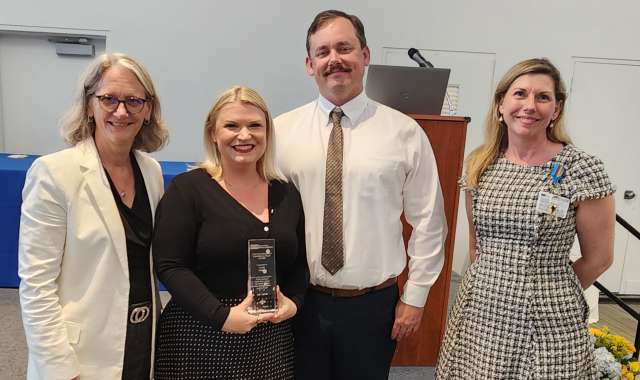
The UCLA Olympic Analytical Laboratory (OAL) is one of the world’s largest World Anti-Doping Agency (WADA) accredited sports drug-testing facilities. As one of the leading institutions in the field of athletic antidoping, OAL is one of two laboratories in the U.S. accredited by WADA. The laboratory analyzes an estimated 40,000 urine specimens per year for traces of banned substances intended to give athletes an unfair edge in competition. The lab performs drug testing for national and international sports organizations, including the National Collegiate Athletics Association (NCAA), National Football League (NFL), Major League Baseball (MLB), the United States Anti-Doping Agency (USADA) and has provided testing services for major sporting events such as the 1994 World Soccer Cup and three Olympic Games.
UCLA OAL has been a leader in research activities directed towards enhancing methods to detect doping in sports. UCLA OAL has contributed to the findings of techniques and substances that currently influence the fight against doping in sports:
- In 1990 UCLA OAL and others conducted research that resulted in the development of a gas chromatography-combustion-isotope ratio mass spectrometry (IRMS) method to detect exogenous testosterone administration. Adaptations of this technique are currently utilized to detect a variety of steroids in urine specimens.
- In 2000 the laboratory identified trace-contamination of an over-the-counter supplement with an anabolic steroid and demonstrated the amount present could result in positive urine test results.
- In 2002 the laboratory identified norbolethone, a steroid that had never been marketed, in an athlete’s urine.
- In 2004 the laboratory published its findings regarding the isolation of tetrahydrogestrinone (THG), a steroid previously unknown in literature.
- In 2009 the laboratory became one of the first among WADA-laboratories to transition to high-throughput testing utilizing 96-well plate format demonstrating that such an approach remained both robust and highly-sensitive.
- In 2018 the laboratory published findings on low-dose ethanol administration effect on the urinary testosterone to epitestosterone ratio by GC-MS/MS as well as urine reference intervals for human chorionic gonadotrophin utilizing a LC-MS/MS based approach.
- In 2019 the laboratory published it findings on the urinary concentration of the AMPK-activator AICAR in an athlete population as well as the utility of isotopically labeled boldenone as a quality control marker for efficiency of chemical derivative formation.
- In 2021 the laboratory published methodology allowing assessment of urinary cobalt by LC-MS/MS technology available in house to all WADA-accredited laboratories where previously such analysis required ICP-MS.
- In 2023 the laboratory published its findings concerning first time detection of the unapproved selective androgen receptor modulator YK-11 in an athlete’s urine.

Back row (left to right): Elise Parsaee, Yan Xu, Ronald Gonzalez, Brian Ahrens, Francis Regacho, Samantha Adams, Mustafa Cittan, Nurali Avliyakulov, Brian Bishop, Timofei Sobolevskii
Front row (left to right): Shirley Taam, Monika Abeywardena, Yulia Kucherova, Fereshteh Delshad, Dr. Dry, Roya Kashanpour, Christina Zaragoza, Tatiana Sergeeva, Lorna Reyes, Maria Gomez
The Advanced Molecular Diagnostics Service (AMDS) has been continuously working on upgrading and streamlining our current clinical genomic and cancer genomic offerings to support integrated clinical care for the UCLA Health System, and to identify, support, and advance UCLA translational research into clinical use and technology transfer.
New BRAF Test Platform
The new BRAF V600 mutation assessment Idylla test platform has completed validation and will be launched in Q1 of 2024.
- Fully automated real-time PCR based molecular testing
- Simplified workflow with < 10 min hands on set up time
- Rapid turnaround time (1 day from sample receiving)
- Flexible sample type (FFPE slides or extracted DNA)
- Effective on limited tissue amount (as low as 1-2 FFPE slides)
- As low as 0.5-1% limit of detection variant frequency
New Clinical Exome Sequencing
The improved workflow will be streamlined for sample preparation and data analysis. The new workflow will be launched in Q1 2024.
- Improved turnaround time by 3 days
- Significant improvement in accuracy for complex variants and insertions/deletions
- Improved sensitivity for SNP variants
- More robust variant interpretation
- Increased exome coverage uniformity
- Reduced cost to achieve minimal sequencing depth

Solid Tumor Pan-Cancer and Fusion Panel Tests (Launched December 2022)
- Optimized workflow that when the Idylla single gene test is ordered with the Pan-Cancer Panel test, no additional tissue slides are needed
- Lowered the number of tissue slides needed for the Solid Tumor Fusion Panel test from 10 to 5 slides
- Improved the overall turnaround time
- Low QNS rate: 3.1% for Fusion Panel Test and 5.7% for Pan-Cancer Panel Test
Outgoing Chief Residents

MLK Day of Service "Mini Pathologist's Play Lab"
As part of the inaugural Martin Luther King Jr. Day of Service | I Have a Dream in STEM Conference, hosted in partnership with the DGSOM JEDI Office and the Department of Medicine’s Community Engagement Office, our Department hosted a Mini Pathologist's Playlab (MPP) workshop for elementary-aged learners from the Heart of Los Angeles (HOLA) and I Have A Dream Foundation. The MPP consisted of six interactive stations spanning anatomic and clinical pathology, allowing learners to interact with Microscopes and slides, Organ Blocks, Agar Plates, Parasites, replica Blood and Plasma, and even a replica Urine Station!
Thank you to our dedicated volunteers who arranged this event on limited notice! Your altruism and commitment to education and our community are evident in the event's great success! A special thank you to Dr. Chana Sachs, Dr. Weibo Yu, Dr. Mario Pulido, Dr. Erica Fermon, Dr. Chao Chen, Dr. Danny Rodriguez, Dr. Yuna Kang, Dr. David Lu, Dr. Dawn Ward, Toshi Ching, Monique Trinh, Jessica Martinez, and the Pathology Facilities team!
